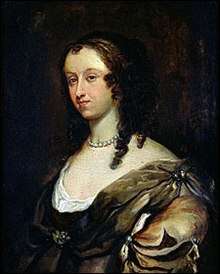Agnes de Castro, or, the Force of Generous Love
Agnes de Castro, or, the Force of Generous Love (also known as The History of Agnes de Castro), is a tragic novel written by Aphra Behn and published posthumously in 1688. It dramatizes the life and murder of Inês de Castro, the lover and posthumously recognized wife of King Peter I of Portugal.
Behn's novel may be an adaptation of a work by Mlle S. B. de Brillac.[1]
Plot
The novel focuses on Constantina, Princess of Portugal; Don Pedro, Prince of Portugal and Constantina's husband; and Agnes de Castro, who is Constantina's loving and loyal friend.
Pedro secretly adores Agnes, but Elvira (who is in love with Don Pedro herself) reveals this to Constantina. Meanwhile, Don Alvaro (the brother of Elvira) tries to secure Agnes's affections. Agnes tries to leave Coimbra, but Constantina and Pedro convince her to stay. Constantina, Pedro and Agnes try to preserve their friendship and love for each other, but struggle with their divided affections. Constantina dies of grief.
Alvaro, following King Alfonso's advice, kidnaps Agnes. After her death, Pedro takes his revenge by embarking on a war against his father.
Reception
Behn's novel was an inspiration for Catharine Trotter's tragedy of the same name, performed at the Theatre Royal in 1695 with great success.[2]
References
- Altaba-Artal, Dolors (1999). Aphra Behn's English feminism : wit and satire. Susquehanna University Press. p. 151. ISBN 1575910292. OCLC 490872295.
- Villegas Lopez, Sonia (2004). Aphra Behn's Sentimental History: The Case Study of Agnes de Castro, or, the Force of Generous Love (1688). p. 240.
